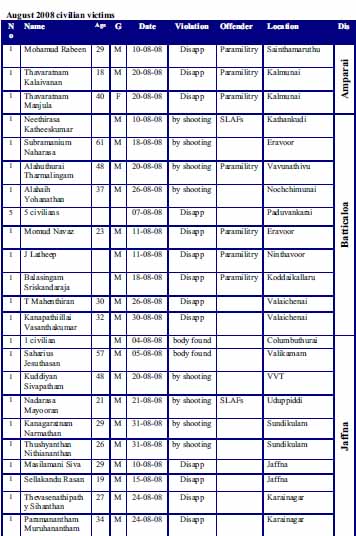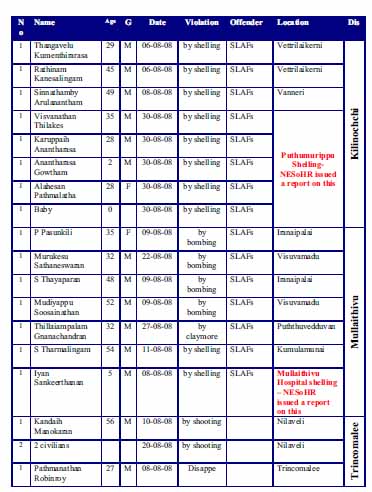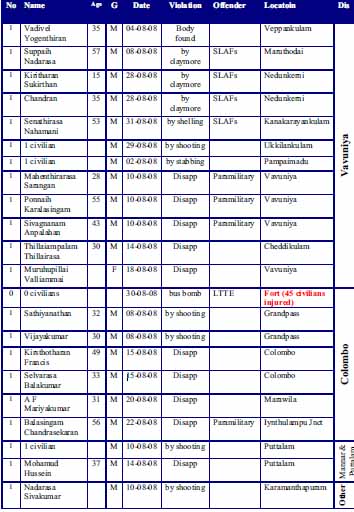NESoHR Monthly Human Report for August 2008- Released 5 september 2008.
Aerial bombing, shelling and claymore attacks in Vanni carried out by the Sri Lanka military are the biggest factor contributing to civilian deaths in the island in August. Vavuniya, Batticaloa, and Jaffina had the next biggest and equal number of conflict related civilian victims. The statistics on civilian victims in the month of August is as follows: killed – 38; disappeared – 24, injured -110; and arrested – 117 (some have been released after inquiry); sought protection at the jaffina Human Rights Commission-7
“In addition to causing 19 civilian deaths in Vanni the bombing, shelling and the claymore attacks caused many injuries and property destruction. In vanni 55 civilians were injured by such attacks. Also close to 50 homes and other public buildings were either damaged or destroyed by these bombings and the shelling.
IDP crisis
Displacement and its flow on effects in Kilinochchi remained the biggest humanitarian issue in the island in August. The offensives, conducted by the Sri Lanka Military, continue to force people to move out of their homes and displace multiple times. Majaority of the displaced are moving to the interior of the Kilinochchi district to avoid the deliberate shelling by the Sri Lanka Military.
In two reports in June and july. NESoHR published updated table of statistics related to the massive displacement in Vanni. The table below is an update to that statistics as at end of August. Kilinochchi district that started in August is new row addition to this table. Number of hospitals that have displaced is also a new column added to this table.
While the actual increase in the number of IDPs from end of july to end of August is 20,000, the IDP movement itself was much higher because the same IDPs moved several times in July and August.
The story of the three IDP families settled within one piece land in Puthumurippu in Kilinochchi, who lost five members to Sri Lanka Military shellting on 30 August, typifies the multiple displacements that the IDP have been through. These three families started their displacement almost a year ago from parapukadanthan in Mannar and had displaced five times before some of them were killed in puthumurippu. This particular IDP killing was reported by NESoHR in a special report.
Many of those killed and injured in Vanni are IDPs. IDPs safety was also put at risk due to unsafe living conditions created by inadequate resources and the chaos of mass scale displacement. Warnings were issued, both within Vanni and also internationally, from several quarters to ensure IDP safety.
Locally there were appeals for precaution in identifying hygienic areas to put up IDP shelters taking into considerations flooding in the coming months. Health authorities warned not to put shelters too close to the road to avoid risking respiratory illness. The local police warned of accidents due to overcrowding of Kilinochchi roads. People were also advised to dig bunkers and seek protection in it without standing outside to watch when Sri Lanka military shells their area.
Meeting the nutritional needs of the IDPs , especially the very young children were another concern of the local health authorities. The relief items provided to the IDPs alone do not meet the nutritional need. At the same time, the IDPs after losing their livehood, are not in a position to purchase vegetables and protein.
Another part of this IDP crisis is the chaos created by the displacement of nearly 34,000 students and 166 schools. August was the month for Grade 5 scholarship examinations and the GCE advanced Level examinations. Education officials reported that nearly 30% of the IDP students registered to sit these examinations failed to sit these examinations. Even those IDP students who did sit the examinations were very badly affected in preparing for the examinations due to displacement.
Internationally too, there were calls to comply with international obligations governing the protection of civilians during armed conflict, which include, measures to prevent displacing people form their homes and livelihoods, and allow civilians maximum freedom of movement to make choices about their safety.
Judging from the civilian deaths, injuries and large scale displacement, and loss of livelihood, it must be said that the Sri Lanka Government has escaped lightly from condemnation for creating the Vanni the IDP crisis. At the same time, the LTTE is unlikely to escape so lightly from international condemnation for not allowing free movement of IDPs away from Vanni.
The reason for this apparent discrepancy in treating the two conducts is the difference in the weight given in international standards to the right of a state of a state to reclaim land compared to the right of a people to reclaim their rights.






